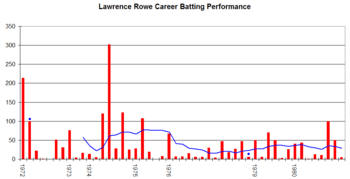Lawrence Rowe
| Personal information | ||||||||||||||||||||||||||||||||||||||||||||||||||||||||||||||||||
|---|---|---|---|---|---|---|---|---|---|---|---|---|---|---|---|---|---|---|---|---|---|---|---|---|---|---|---|---|---|---|---|---|---|---|---|---|---|---|---|---|---|---|---|---|---|---|---|---|---|---|---|---|---|---|---|---|---|---|---|---|---|---|---|---|---|---|
| Full name | Lawrence George Rowe | |||||||||||||||||||||||||||||||||||||||||||||||||||||||||||||||||
| Born |
8 January 1949 Kingston, Colony of Jamaica | |||||||||||||||||||||||||||||||||||||||||||||||||||||||||||||||||
| Nickname | Yagga | |||||||||||||||||||||||||||||||||||||||||||||||||||||||||||||||||
| Batting style | Right-handed | |||||||||||||||||||||||||||||||||||||||||||||||||||||||||||||||||
| Bowling style | Left-arm fast-medium | |||||||||||||||||||||||||||||||||||||||||||||||||||||||||||||||||
| International information | ||||||||||||||||||||||||||||||||||||||||||||||||||||||||||||||||||
| National side | ||||||||||||||||||||||||||||||||||||||||||||||||||||||||||||||||||
| Test debut | 16 February 1972 v New Zealand | |||||||||||||||||||||||||||||||||||||||||||||||||||||||||||||||||
| Last Test | 29 February 1980 v New Zealand | |||||||||||||||||||||||||||||||||||||||||||||||||||||||||||||||||
| ODI debut | 20 December 1975 v Australia | |||||||||||||||||||||||||||||||||||||||||||||||||||||||||||||||||
| Last ODI | 6 February 1980 v New Zealand | |||||||||||||||||||||||||||||||||||||||||||||||||||||||||||||||||
| Domestic team information | ||||||||||||||||||||||||||||||||||||||||||||||||||||||||||||||||||
| Years | Team | |||||||||||||||||||||||||||||||||||||||||||||||||||||||||||||||||
| 1968–1982 | Jamaica | |||||||||||||||||||||||||||||||||||||||||||||||||||||||||||||||||
| 1974 | Derbyshire | |||||||||||||||||||||||||||||||||||||||||||||||||||||||||||||||||
| Career statistics | ||||||||||||||||||||||||||||||||||||||||||||||||||||||||||||||||||
| ||||||||||||||||||||||||||||||||||||||||||||||||||||||||||||||||||
| Source: Cricket Archive, 17 October 2010 | ||||||||||||||||||||||||||||||||||||||||||||||||||||||||||||||||||
Lawrence George Rowe (born 8 January 1949) is a former West Indian cricketer.
Lawrence, also known as "Yagga", was an elegant right-handed batsman described by Michael Holding, his team mate, as "the best batsman I ever saw". It was felt that his ability was so extraordinary that Sobers believed he could have been the greatest of all West Indian batsmen. At one game Rowe hit a ball so cleanly that it followed a level trajectory like a guided missile over the boundary for six. Gideon Haigh describes the incident:
Early in his innings against England at Kensington Oval, Bridgetown, Barbados, in March 1974, he received a bouncer from Bob Willis. He smashed it flat into the stand at square leg; it travelled most of the way at head height.[1]
He made his debut for Jamaica in 1968–69. He then made history on his Test match debut v New Zealand at Sabina Park, Kingston in 1972, scoring 214 and 100 not out, the first time that a cricketer had scored a double and single century on Test debut. It also gave him a batting average of 314 after his first Test match.
In 1974 v England he scored 302 at Kensington Oval in Barbados.
On his arrival in Australia for the 1975–76 tour Rowe was being hailed as the best batsman in the world. A century in his second Test innings in Australia maintained his average at over 70 runs per innings and it seemed to confirm his reputation. The team were humiliated by the Australian side over the rest of the series and Rowe never regained his previously devastating form.
Rowe was a West Indies batting "hero" in the days before Viv Richards. He played 30 Test matches scoring a total of 2,047 runs at an average of 43. He was known to whistle while he batted though he seemed to be injury prone; he suffered problems with his eyesight and was allergic to grass.
He played 30 Tests between 1972 and 1980 and played 11 One Day Internationals. Rowe played for Derbyshire in the English County Championship and also joined World Series Cricket, where he scored 175 in one match for the WSC West Indies XI.[2] He is one of only four West Indian batsman to have scored a triple century, the others being Garfield Sobers, Chris Gayle and Brian Lara.
Rowe, when past his prime, became infamous in 1982–83, because he led a rebel tour to South Africa during the days of apartheid when they were isolated from world sport.[3] The West Indian public were outraged by the tour and Rowe himself and others were ostracised in Jamaica. This may have been a primary reason for Rowe subsequently settling in Miami, USA. During the lunch break of the first Test between West Indies and India on 20 June 2011, Rowe was honoured when the Sabina Park stadium was named after him, in a ceremony that also honoured Michael Holding and Courtney Walsh. He took the opportunity to lay those ghosts to rest with an apology on behalf of that ill-fated team, saying:[4]
"...Today I sincerely apologise to the cricketing fraternity of Jamaica, the Caribbean and the rest of the world."
However, after much protest, Lindel Wright, JCA president, the decision was revoked by the board after Rowe stated publicly that he saw nothing wrong with his decision to tour apartheid South Africa.[5]

References
External links
- Lawrence Rowe interviewed by Caribbeancricket.com
- Article on Lawrence Rowe at Caribbeancricket.com
- Article on Lawrence Rowe on BBC website
- Cricinfo statistics for Lawrence Rowe
- Stats Rleague
- Fairfax article